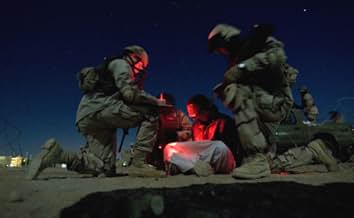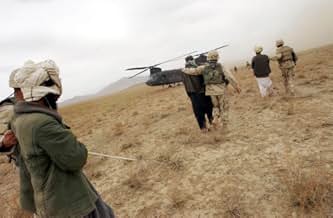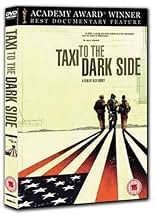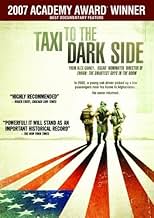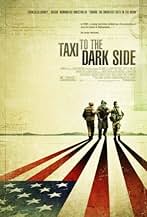IMDb रेटिंग
7.5/10
17 हज़ार
आपकी रेटिंग
अपनी भाषा में प्लॉट जोड़ेंAlex Gibney exposes the haunting details of the USA's torture and interrogation practices during the War in Afghanistan.Alex Gibney exposes the haunting details of the USA's torture and interrogation practices during the War in Afghanistan.Alex Gibney exposes the haunting details of the USA's torture and interrogation practices during the War in Afghanistan.
- 1 ऑस्कर जीते
- 10 जीत और कुल 5 नामांकन
Alex Gibney
- Narrator
- (वॉइस)
Moazzam Begg
- Self - Torture Victim
- (as Moazzam Beg)
George W. Bush
- Self
- (आर्काइव फ़ूटेज)
Jack Cafferty
- Self
- (आर्काइव फ़ूटेज)
Dick Cheney
- Self
- (आर्काइव फ़ूटेज)
Lynndie England
- Self
- (आर्काइव फ़ूटेज)
Tommy Franks
- Self - General
- (आर्काइव फ़ूटेज)
फ़ीचर्ड समीक्षाएं
Taxi to the Dark Side doesn't contain anything wholly new, just more complete detail and important clarifications, such as the fact that Guantanamo uses very much the same basic methods to Abu Ghraib, though the location is cleaner and of course was not formerly used by Saddam Hussein. Dilawar, the Afghan taxi driver, was essentially beaten to death by American soldiers in the Bagram prison. He did not live long once his ill-trained but plainly-directed captors got hold of him, but his final hours were terrifying and horrible. They kicked his legs till they turned to pulp and would have had to be amputated, had he lived. A heart condition caused an embolism that went to his brain and was the cause of death, which on the official US papers given to Dilawar's family, in English so they did not know what they meant, was "homicide," but the officer in charge of the prison denied this when queried. Gibney, who was responsible previously for the documentary Enron: The Smartest Guys in the Room, presents interviews with some of the American soldiers responsible for Dilawar's death. They were, of course, only following orders. Other talking heads clarify the fact that the "gloves are off" policy by US authorities following 9/11/01 goes back to Cheney, approved by Bush, carried out with gusto by Rumsfeld, and sent directly down the line to the low-ranking and inexperienced people whose behavior after the Abu Ghraib scandal emerged was claimed by authorities to be that of people on the "night shift" or "a few bad apples." This film thoroughly disproves that claim.
Gibney shows how the US administration has become willing to blatantly disregard the rule of law, domestic as well as international, to fight their "war on terror" in ways that involved extreme cruelty and murder. In doing this they had the assistance of various corrupt or immoral--or, if you prefer, simply very misguided--men of the law and the judiciary.
The practices have been illegal. They may also have been variously unwise. The photos of Americans mistreating Muslim prisoners at Abu Ghraib are good recruiting material for anti-US terrorists. But torture also simply doesn't work, accomplishes nothing useful. Much time is given to Alfred McCoy, author of a book called 'The Question of Torture' and a professor of history at the University of Wisconsin. McCoy recounts that the CIA has been working on methods of coercion for all the decades of its existence, but their experiments have yielded little except lawsuits from victimized guinea pigs. Another authority, a former CIA operative, asserts that the best method to obtain information is to gain the confidence of the prisoner and convince him you can help him.
But post 9/11 "high value" prisoners were clearly tortured with anything their captors could think of--and then confessed to anything they could think of. The film clarifies that psychological experiments by Donald Hobb at McGill University in the Seventies proved sensory deprivation is the most effective means of torture; at least according to Hobb it can induce psychosis within 48 hours. The film shows that basically all "terrorism" suspects here and abroad have been subjected to sensory deprivation. That is what covering the ears, head, and hands does; and it was and is standard treatment to continue this for hours and days. This is more effective than pain. But effective at doing what? Breaking down the prisoner, not obtaining reliable information, or any information, for that matter.
Hence the widely spread US policies are not only harmful, dangerous, immoral, and illegal, but stupid and, in intelligence-gathering terms, worthless.
The "extraordinary rendition," waterboarding, sensory deprivation, etc. don't work in practical terms, but they have a political purpose. They convince people that the US is "getting tough" on its enemies. But the US has not been holding real enemies. If it were, the useless prisoners or wrongly captured would be filtered out, as Dilawar ought to have been. He was innocent. And now the US authorities are in a bad position. They cannot acquit even those few Guantanamo prisoners they are putting up for show trials, because to do so would reveal that they had been held for six years for no reason. That would look bad. Varieties of Orwellian terminology have been devised to describe these prisoners. The film also shows "tours" of Guantanamo and deflates the claims of the tour guides.
One reason for all this is who's been in charge: a group of draft dodgers who never served in a war. Senator McCain is shown in the film as a man who opposes torture for good reason: because he experienced it during his years in a North Vietnam prison.
Another issue: American has a developed a culture of guilty-as-charged, of hysterical attacks on imagined enemies. An example: the popular jingoistic TV program "24," starring Kiefer Sutherland as a CIA agent who "saves" millions by torturing mad terrorists with ticking bombs in Times Square. A Dark Side talking head says that there has never been such a person captured, and suggests that if there were, such a person would have the commitment to die rather than reveal information about his plot.
I do not know if torture never gets you information, though the assertion that insinuating oneself into the confidence of a prisoner is more effective makes sense. What is clear enough from Gibney's powerful and disturbing film (which contains many images not for the squeamish) is that the torture and wrongful imprisonment and lawlessness of the US as a nation post-9/11 indicate a country that has become very cruel and very stupid.
Andrew O'Hehir of Salon.com recounts that at a post-screening Q&A when Gibney was asked what he would like his film to accomplish, he said "I hope it provokes some rage." "Well," says O'Hehir, "it worked on me." May it work on everyone who sees it.
Gibney shows how the US administration has become willing to blatantly disregard the rule of law, domestic as well as international, to fight their "war on terror" in ways that involved extreme cruelty and murder. In doing this they had the assistance of various corrupt or immoral--or, if you prefer, simply very misguided--men of the law and the judiciary.
The practices have been illegal. They may also have been variously unwise. The photos of Americans mistreating Muslim prisoners at Abu Ghraib are good recruiting material for anti-US terrorists. But torture also simply doesn't work, accomplishes nothing useful. Much time is given to Alfred McCoy, author of a book called 'The Question of Torture' and a professor of history at the University of Wisconsin. McCoy recounts that the CIA has been working on methods of coercion for all the decades of its existence, but their experiments have yielded little except lawsuits from victimized guinea pigs. Another authority, a former CIA operative, asserts that the best method to obtain information is to gain the confidence of the prisoner and convince him you can help him.
But post 9/11 "high value" prisoners were clearly tortured with anything their captors could think of--and then confessed to anything they could think of. The film clarifies that psychological experiments by Donald Hobb at McGill University in the Seventies proved sensory deprivation is the most effective means of torture; at least according to Hobb it can induce psychosis within 48 hours. The film shows that basically all "terrorism" suspects here and abroad have been subjected to sensory deprivation. That is what covering the ears, head, and hands does; and it was and is standard treatment to continue this for hours and days. This is more effective than pain. But effective at doing what? Breaking down the prisoner, not obtaining reliable information, or any information, for that matter.
Hence the widely spread US policies are not only harmful, dangerous, immoral, and illegal, but stupid and, in intelligence-gathering terms, worthless.
The "extraordinary rendition," waterboarding, sensory deprivation, etc. don't work in practical terms, but they have a political purpose. They convince people that the US is "getting tough" on its enemies. But the US has not been holding real enemies. If it were, the useless prisoners or wrongly captured would be filtered out, as Dilawar ought to have been. He was innocent. And now the US authorities are in a bad position. They cannot acquit even those few Guantanamo prisoners they are putting up for show trials, because to do so would reveal that they had been held for six years for no reason. That would look bad. Varieties of Orwellian terminology have been devised to describe these prisoners. The film also shows "tours" of Guantanamo and deflates the claims of the tour guides.
One reason for all this is who's been in charge: a group of draft dodgers who never served in a war. Senator McCain is shown in the film as a man who opposes torture for good reason: because he experienced it during his years in a North Vietnam prison.
Another issue: American has a developed a culture of guilty-as-charged, of hysterical attacks on imagined enemies. An example: the popular jingoistic TV program "24," starring Kiefer Sutherland as a CIA agent who "saves" millions by torturing mad terrorists with ticking bombs in Times Square. A Dark Side talking head says that there has never been such a person captured, and suggests that if there were, such a person would have the commitment to die rather than reveal information about his plot.
I do not know if torture never gets you information, though the assertion that insinuating oneself into the confidence of a prisoner is more effective makes sense. What is clear enough from Gibney's powerful and disturbing film (which contains many images not for the squeamish) is that the torture and wrongful imprisonment and lawlessness of the US as a nation post-9/11 indicate a country that has become very cruel and very stupid.
Andrew O'Hehir of Salon.com recounts that at a post-screening Q&A when Gibney was asked what he would like his film to accomplish, he said "I hope it provokes some rage." "Well," says O'Hehir, "it worked on me." May it work on everyone who sees it.
With a title like Taxi to the Dark Side, you know it's not going to be a light-and-fluffy film, but it's a film that needed to be made, and should be seen by everyone.
The measure of a nation is how well it lives up to its ideals in the worst of times. 9/11 was that trial for America, and America failed. If you do not believe that former U.S. president George W. Bush, former vice president Dick Cheney, Secretary of Defense Donald Rumsfeld, White House Council John Yoo, and at least a half dozen other members of the Bush Administration are guilty of war crimes, you must see this documentary.
Even if you suspect they do, but have lingering doubts – you must see this documentary.
And especially if you don't know either way, and know nothing about this issue – you must see this documentary.
This is not some sort of Michael Moore propaganda piece. This transcends partisan politics. It deals with a broader issue. It focuses on the treatment of just one detainee and will probably make you sick to your stomach – if you can stomach it at all. And then reminds you that this happened not to just one guy, but to 83,000 others too.
Hell yes, its difficult to watch - there is graphic photos of torture – but is that an excuse not to watch it? The fact is they are presented because showing them is necessary to fully understand the extent of what went on. And guess what? If you are an American, you damn well should sit through this, because you are guilty too – this is what your elected officials did.
Of course when word finally got out, and they got blowback for it, in an outrageous act of cowardice, they left their own subordinates out to dry.
The film makes the case, clearly, efficiently and thoroughly. Which makes it not only an excellent documentary, but an important one too.
The measure of a nation is how well it lives up to its ideals in the worst of times. 9/11 was that trial for America, and America failed. If you do not believe that former U.S. president George W. Bush, former vice president Dick Cheney, Secretary of Defense Donald Rumsfeld, White House Council John Yoo, and at least a half dozen other members of the Bush Administration are guilty of war crimes, you must see this documentary.
Even if you suspect they do, but have lingering doubts – you must see this documentary.
And especially if you don't know either way, and know nothing about this issue – you must see this documentary.
This is not some sort of Michael Moore propaganda piece. This transcends partisan politics. It deals with a broader issue. It focuses on the treatment of just one detainee and will probably make you sick to your stomach – if you can stomach it at all. And then reminds you that this happened not to just one guy, but to 83,000 others too.
Hell yes, its difficult to watch - there is graphic photos of torture – but is that an excuse not to watch it? The fact is they are presented because showing them is necessary to fully understand the extent of what went on. And guess what? If you are an American, you damn well should sit through this, because you are guilty too – this is what your elected officials did.
Of course when word finally got out, and they got blowback for it, in an outrageous act of cowardice, they left their own subordinates out to dry.
The film makes the case, clearly, efficiently and thoroughly. Which makes it not only an excellent documentary, but an important one too.
Yep, it is another one of those Iraq and Afghanistan documentaries. I know the burnout rate is high on these, which is probably why I almost did not bother, but nothing else was showing. Man, was I happy I saw this! It has rekindled my hate for the Bush administration, which had turned to apathy over the last year. This tells the story of an Afghani taxi driver that is mistakenly picked up as a Taliban supporter, but before they find out he was innocent, he has been beaten to death by his American torturers.
This film has interviews from all of the guards that were responsible, JAG officers, FBI people, CIA agents on the ground etc. And you see that all of the blame lies with Ashcroft and the Bushies, who gave one vague order after another that they wanted confessions and they wanted them quickly, with a wink and a nod about what kind of methods to use. So you have these frustrated high school drop-outs presiding over these people thousands of miles from anywhere, and they won't confess. So, beatings and humiliations follow. And when the crap comes out, the Bush administration passes a bill that absolves all higher-ups from any responsibility and they start to bust the enlisted men and women, who were following orders. Pathetic. Of course, we also find out that over 95% of the prisoners being held, were captured by Pakistanis and Northern Alliance people, WHO were paid by the US government for each person they turned over, guilty or not guilty. And you wonder why meaningful confessions were so hard to come by. It reminds me of the scene from Full Metal Jacket, where the psycho army guy shoots the Vietnamese farmers from his helicopter. He says the ones that run are VC, the ones that don't run are well trained VC. Very tragic.
This film has interviews from all of the guards that were responsible, JAG officers, FBI people, CIA agents on the ground etc. And you see that all of the blame lies with Ashcroft and the Bushies, who gave one vague order after another that they wanted confessions and they wanted them quickly, with a wink and a nod about what kind of methods to use. So you have these frustrated high school drop-outs presiding over these people thousands of miles from anywhere, and they won't confess. So, beatings and humiliations follow. And when the crap comes out, the Bush administration passes a bill that absolves all higher-ups from any responsibility and they start to bust the enlisted men and women, who were following orders. Pathetic. Of course, we also find out that over 95% of the prisoners being held, were captured by Pakistanis and Northern Alliance people, WHO were paid by the US government for each person they turned over, guilty or not guilty. And you wonder why meaningful confessions were so hard to come by. It reminds me of the scene from Full Metal Jacket, where the psycho army guy shoots the Vietnamese farmers from his helicopter. He says the ones that run are VC, the ones that don't run are well trained VC. Very tragic.
9imxo
There is something you need to know about this film: it is not about real insurgents or terrorists or about real soldiers, and it is certainly not an anti-American film.
It is about how senior military and civilian officials demand results from their subordinates, even if the results are to be obtained by unconscionable, immoral, and illegal means, up to, and including, torture and murder. The fact that many of these results - what the military like to call "the mission" - are faked or just wrong is of no particular concern to them. Naturally, you'll never find a document signed by any of those officials advocating torture and murder. The most you'll ever find is a reference to "enhanced interrogation techniques" (i.e., torture). And if a detainee dies, the senior officers and officials always benefit from "plausible deniability" and claim that it must be the fault of junior "bad apple" troops. If terrorists are murderers, some of our own troops have certainly engaged in murder, too. To reveal this is not anti-American; it's just a simple fact. Because the troops often do it in a group they think they're not murderers. Just as, I imagine, someone who participates in gang rape does not consider himself, individually, to be a rapist.
While most Military Police (MP) troops are fighting hard on the ground every day in Iraq and Afghanistan, one group of troops which this film examines are those Military Police who are used as prison guards. The other troops examined in the film are some military intelligence ("MI") troops employed as interrogators in prison camps.
If you don't know already, Military Police are usually despised by their own troops. If you give a soldier special power over his fellow soldiers he will often abuse it. I still recall an Australian friend of mine mentioning that many of the Aussie "Red Hats" (MPs) who sailed for home after WWII never made it back; their fellow troops threw them overboard.
The old saw about military intelligence being a contradiction in terms is never more apparent than in the case of interrogators. When you hear the word intelligence here you must forget all about spies, codes, and the stuff of James Bond novels. The interrogators of MI are an example of soldiers who are ill prepared, in general, to carry out work that would normally take years to master. They are mostly low-ranking enlisted men and women, privates and sergeants, almost none of whom speak with any proficiency the language of the detainees they're interrogating.
So, imagine the scenario: senior officials demanding intelligence, no matter how it's obtained; unqualified interrogators using whatever means they can think of to satisfy their superiors' demands; and MP prison guards who have the power of life and death over their detainees, with almost no restrictions on what they can do to them. Behind all this is the unwritten understanding that if something goes wrong, the troops will probably not be prosecuted. God help the innocent person swept up into this sadistic, bureaucratic system. But as we all know, if you've been arrested, you must be guilty. Right?
The elephant in the closet in all this is the Central Intelligence Agency, an organization that regards itself as above law, morality, and civilized behavior. It gets away with much of what it does by having the military, foreigners, and contractors to do its dirty work for it. And when somebody has to take a fall, well, that's what privates and sergeants are for. If your kids are MPs, interrogators, or just in the military, advise them always to watch their backs around those people.
This may be a disturbing film for civilians, but it won't include many surprises if you've served in the armed forces, or on a police force, or in a prison. Those are the people who know about this, but they're not about to tell you. No wander the USA has pulled out of the War Crimes Treaty. But what officials do not want to admit, even to themselves, is that war crimes are war crimes, no matter if you're a treaty signatory or not.
It is about how senior military and civilian officials demand results from their subordinates, even if the results are to be obtained by unconscionable, immoral, and illegal means, up to, and including, torture and murder. The fact that many of these results - what the military like to call "the mission" - are faked or just wrong is of no particular concern to them. Naturally, you'll never find a document signed by any of those officials advocating torture and murder. The most you'll ever find is a reference to "enhanced interrogation techniques" (i.e., torture). And if a detainee dies, the senior officers and officials always benefit from "plausible deniability" and claim that it must be the fault of junior "bad apple" troops. If terrorists are murderers, some of our own troops have certainly engaged in murder, too. To reveal this is not anti-American; it's just a simple fact. Because the troops often do it in a group they think they're not murderers. Just as, I imagine, someone who participates in gang rape does not consider himself, individually, to be a rapist.
While most Military Police (MP) troops are fighting hard on the ground every day in Iraq and Afghanistan, one group of troops which this film examines are those Military Police who are used as prison guards. The other troops examined in the film are some military intelligence ("MI") troops employed as interrogators in prison camps.
If you don't know already, Military Police are usually despised by their own troops. If you give a soldier special power over his fellow soldiers he will often abuse it. I still recall an Australian friend of mine mentioning that many of the Aussie "Red Hats" (MPs) who sailed for home after WWII never made it back; their fellow troops threw them overboard.
The old saw about military intelligence being a contradiction in terms is never more apparent than in the case of interrogators. When you hear the word intelligence here you must forget all about spies, codes, and the stuff of James Bond novels. The interrogators of MI are an example of soldiers who are ill prepared, in general, to carry out work that would normally take years to master. They are mostly low-ranking enlisted men and women, privates and sergeants, almost none of whom speak with any proficiency the language of the detainees they're interrogating.
So, imagine the scenario: senior officials demanding intelligence, no matter how it's obtained; unqualified interrogators using whatever means they can think of to satisfy their superiors' demands; and MP prison guards who have the power of life and death over their detainees, with almost no restrictions on what they can do to them. Behind all this is the unwritten understanding that if something goes wrong, the troops will probably not be prosecuted. God help the innocent person swept up into this sadistic, bureaucratic system. But as we all know, if you've been arrested, you must be guilty. Right?
The elephant in the closet in all this is the Central Intelligence Agency, an organization that regards itself as above law, morality, and civilized behavior. It gets away with much of what it does by having the military, foreigners, and contractors to do its dirty work for it. And when somebody has to take a fall, well, that's what privates and sergeants are for. If your kids are MPs, interrogators, or just in the military, advise them always to watch their backs around those people.
This may be a disturbing film for civilians, but it won't include many surprises if you've served in the armed forces, or on a police force, or in a prison. Those are the people who know about this, but they're not about to tell you. No wander the USA has pulled out of the War Crimes Treaty. But what officials do not want to admit, even to themselves, is that war crimes are war crimes, no matter if you're a treaty signatory or not.
Taxi to the Dark Side accomplishes what a documentary, or just a concise analysis, regarding all of the facts in one of the many nightmares the United States' involvement in the middle east should: to inspire the utmost disgust and condemnation of a system that has become as corrupt as it has (or rather always has been with this bunch). It's uncontainable to think how all of this started, grew exponentially, and resulted ultimately in the horrors at Abu Gharyb and Guantanamo Bay, in that it is nestled in the twisted, criminal (yes folks, criminal) 'policies' of the Bush administration. But Alex Gibney's approach isn't narrow-minded but multi-faceted: he's interested in what a complex, ugly organism torture has become, the psychological just as much as the physical, and he has a man at the center of it. Dilawar, an innocent taxi driver from a poor farm in Afghanistan, was swept up by three other Afghan soldiers and sent to Bagram prison, where along with other supposed terrorists or terrorist collaborators was tortured (in his case especially in brutal fashion, as we learn in graphic description from those who participated first-hand), and died from the trauma.
His death was a controversy, but not one that ever got the kind of attention it deserved; until this documentary I never even heard of Dilawar or even much about Bagram prison. Yet it was at this prison, as well as the first biggie interrogation of the would-be 20th hijacker of the plane on 9/11 to crash in Pennsylvania (which, by false confession, led to an over-excited but false-rooted assumption that Al Quaeda had links to Baghdad), that led to Abu Gharyb, which revealed the horrors of soldiers in unyielding terror over their subjects but, more importantly, the virus that spread through the chain of command. Gibney's approach is approximate and expertly probing: it's not enough to just focus of Dilawar (even as his story could make up a whole legitimate documentary alone), or on Abu Gharyb. As in his previous film, Enron: The Smartest Guys in the Room, it's essential to dissect this wretched beast from top to bottom, to see not simply the soldiers first-hand accounts, but straight from the horse's mouth the words from Cheney, Rumsfeld, Powell, and Bush himself.
Because, in reality, there is something to feel sorry for with these soldiers. It can be argued, and not without just cause, that what the soldiers did at Bagram, Abu Gharyb, and to an extent even at GITMO, was wrong and rotten and they could have said no and so on and so forth. However, as with the ground war situation in Iraq, it's all about the chain of command, and the fact that no matter what the parties initially responsible are not held accountable for any of their actions. It's almost frightening to forget the amount of footage available with these men like Rumsfeld and Gonzalez and Cheney where they not only admit to being fine with torture tactics - and whether or not it's psychological torture or not is besides the point as ALL torture IS torture, albeit a facet that Gibney brilliantly chronicles in the history of the CIA to its 'logical' extension in recent years - but set it up in legal wrangling so as to not get it any trouble for what they've done which is, of course, breaking Geneva conventions and whatnot.
If I sound like I'm sounding bias with this, then you should leave this review right now. There is no bias when it comes to this issue (or rather there SHOULD be no bias, as for a split second McCain showed until he relented recently that torture isn't as bad as he used to think). What one sees as the line between what is proper interrogation of a subject and outright abuse to get that "ticking time-bomb" is revealed by Kloogman from the FBI, who paraphrases how an interrogation would usually be done and lays it on the line that this form has actually had results - not pain and death or, at best, a bull**** court at GITMO where it's like a joke Kafka wouldn't write. Gibney presents all the information with the bluntness that's required, with testimony, footage from press conferences and commissions (i.e. that cringe-inducing bit with Gonzalez where he has a horrible pause when trying to answer a simple question about whether or not to condone torture), and it's presented lucidly, edited for a cumulative effect and with the skill of a filmmaker in total trust with his subject(s) to take all of the pieces into a whole that shakes one to the core.
And all of this would be powerful enough to make an impact, but with the recent explosion of news coverage on water-boarding - and that the CIA has admitted to torturing three subjects - Taxi to the Dark Side remains startlingly relevant. In fact, it's even more tragically relevant than last year's Sicko or even No End in Sight. From the tragedy of Dilawar to the tragedy of Abu Gharyb, which was like Salo turned into as shockingly real as could never be imaginable, the Bush administration has put the US into even more danger than ever before by resorting to the lowest form of humanity, condoning acts to the soldiers that sixty years ago would never be committed in the harshest of circumstances on our side. This, again, isn't some silly bias, this is just fact. It's enough to make one sick to one's stomach, and as long as a film such as this exists, the pain can't be brushed aside or dulled by diverting network news.
His death was a controversy, but not one that ever got the kind of attention it deserved; until this documentary I never even heard of Dilawar or even much about Bagram prison. Yet it was at this prison, as well as the first biggie interrogation of the would-be 20th hijacker of the plane on 9/11 to crash in Pennsylvania (which, by false confession, led to an over-excited but false-rooted assumption that Al Quaeda had links to Baghdad), that led to Abu Gharyb, which revealed the horrors of soldiers in unyielding terror over their subjects but, more importantly, the virus that spread through the chain of command. Gibney's approach is approximate and expertly probing: it's not enough to just focus of Dilawar (even as his story could make up a whole legitimate documentary alone), or on Abu Gharyb. As in his previous film, Enron: The Smartest Guys in the Room, it's essential to dissect this wretched beast from top to bottom, to see not simply the soldiers first-hand accounts, but straight from the horse's mouth the words from Cheney, Rumsfeld, Powell, and Bush himself.
Because, in reality, there is something to feel sorry for with these soldiers. It can be argued, and not without just cause, that what the soldiers did at Bagram, Abu Gharyb, and to an extent even at GITMO, was wrong and rotten and they could have said no and so on and so forth. However, as with the ground war situation in Iraq, it's all about the chain of command, and the fact that no matter what the parties initially responsible are not held accountable for any of their actions. It's almost frightening to forget the amount of footage available with these men like Rumsfeld and Gonzalez and Cheney where they not only admit to being fine with torture tactics - and whether or not it's psychological torture or not is besides the point as ALL torture IS torture, albeit a facet that Gibney brilliantly chronicles in the history of the CIA to its 'logical' extension in recent years - but set it up in legal wrangling so as to not get it any trouble for what they've done which is, of course, breaking Geneva conventions and whatnot.
If I sound like I'm sounding bias with this, then you should leave this review right now. There is no bias when it comes to this issue (or rather there SHOULD be no bias, as for a split second McCain showed until he relented recently that torture isn't as bad as he used to think). What one sees as the line between what is proper interrogation of a subject and outright abuse to get that "ticking time-bomb" is revealed by Kloogman from the FBI, who paraphrases how an interrogation would usually be done and lays it on the line that this form has actually had results - not pain and death or, at best, a bull**** court at GITMO where it's like a joke Kafka wouldn't write. Gibney presents all the information with the bluntness that's required, with testimony, footage from press conferences and commissions (i.e. that cringe-inducing bit with Gonzalez where he has a horrible pause when trying to answer a simple question about whether or not to condone torture), and it's presented lucidly, edited for a cumulative effect and with the skill of a filmmaker in total trust with his subject(s) to take all of the pieces into a whole that shakes one to the core.
And all of this would be powerful enough to make an impact, but with the recent explosion of news coverage on water-boarding - and that the CIA has admitted to torturing three subjects - Taxi to the Dark Side remains startlingly relevant. In fact, it's even more tragically relevant than last year's Sicko or even No End in Sight. From the tragedy of Dilawar to the tragedy of Abu Gharyb, which was like Salo turned into as shockingly real as could never be imaginable, the Bush administration has put the US into even more danger than ever before by resorting to the lowest form of humanity, condoning acts to the soldiers that sixty years ago would never be committed in the harshest of circumstances on our side. This, again, isn't some silly bias, this is just fact. It's enough to make one sick to one's stomach, and as long as a film such as this exists, the pain can't be brushed aside or dulled by diverting network news.
क्या आपको पता है
- भाव
Damien Corsetti - Military Interrogator: You put people into a crazy situation, people will do crazy things.
- साउंडट्रैकIn My Little Corner of the World
Words by Bob Hilliard Music by Lee Pockriss
Published by Better Half Music (Division of Bourne Co.)
and Emily Music Corporation
Performed by Yo La Tengo
Courtesy of Matador Records
टॉप पसंद
रेटिंग देने के लिए साइन-इन करें और वैयक्तिकृत सुझावों के लिए वॉचलिस्ट करें
- How long is Taxi to the Dark Side?Alexa द्वारा संचालित
विवरण
बॉक्स ऑफ़िस
- बजट
- $10,00,000(अनुमानित)
- US और कनाडा में सकल
- $2,74,661
- US और कनाडा में पहले सप्ताह में कुल कमाई
- $10,930
- 20 जन॰ 2008
- दुनिया भर में सकल
- $2,94,309
- चलने की अवधि1 घंटा 46 मिनट
- रंग
- ध्वनि मिश्रण
- पक्ष अनुपात
- 1.85 : 1
इस पेज में योगदान दें
किसी बदलाव का सुझाव दें या अनुपलब्ध कॉन्टेंट जोड़ें







